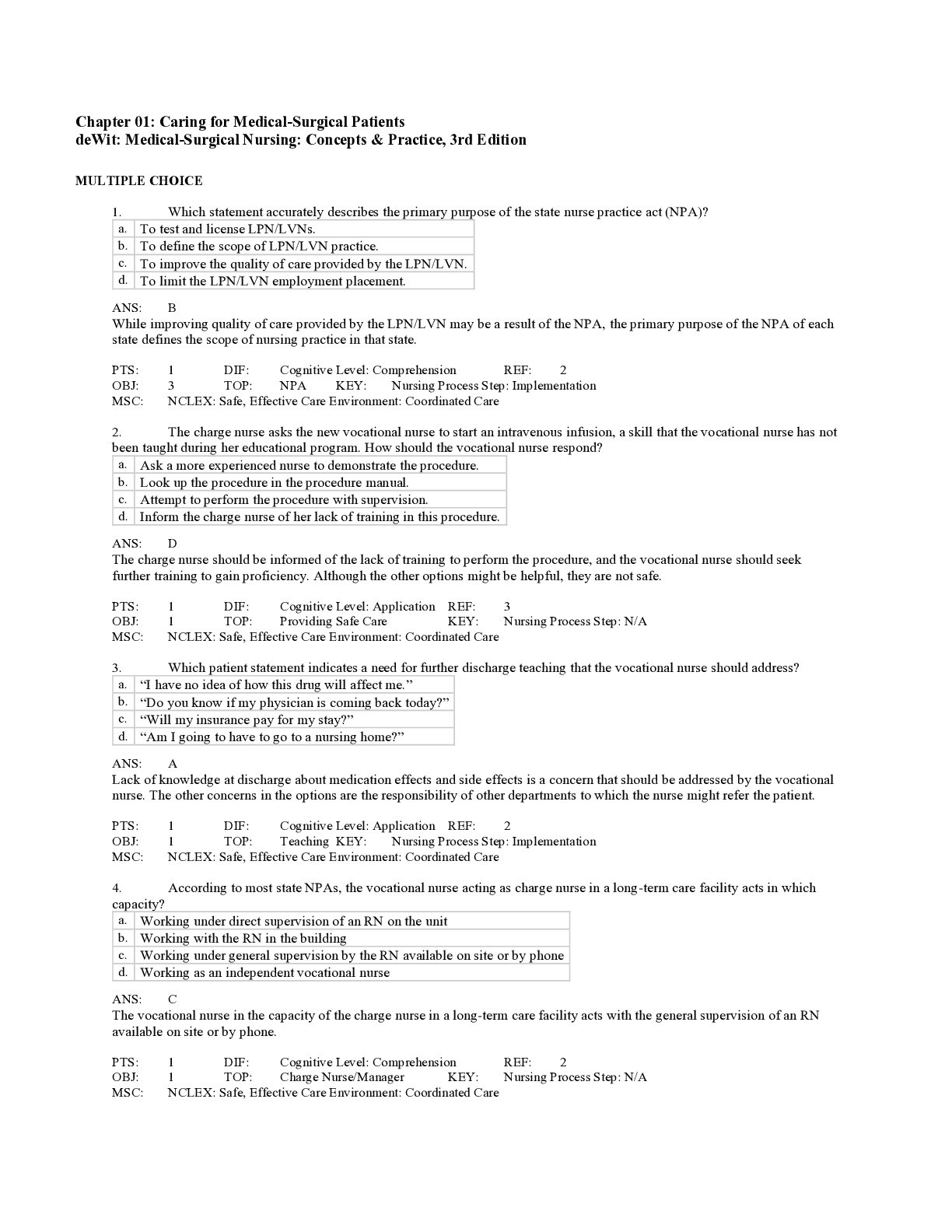All study resources > Medical-Surgical Nursing- Concepts and Practice 3th Edition (Nursing)
Medical-Surgical Nursing- Concepts and Practice 3th Edition
1. Which statement accurately describes the primary purpose of the state nurse practice act (NPA)?
a. To test and license LPN/LVNs.
b. To define the scope of LPN/LVN practice.
c. To improve the quality of care provided by the LPN/LVN.
d. To limit the LPN/LVN employment placement.
2. The charge nurse asks the new vocational nurse to start an intravenous infusion, a skill that the vocational
...[Show More]
1. Which statement accurately describes the primary purpose of the state nurse practice act (NPA)?
a. To test and license LPN/LVNs.
b. To define the scope of LPN/LVN practice.
c. To improve the quality of care provided by the LPN/LVN.
d. To limit the LPN/LVN employment placement.
2. The charge nurse asks the new vocational nurse to start an intravenous infusion, a skill that the vocational nurse has not
been taught during her educational program. How should the vocational nurse respond?
a. Ask a more experienced nurse to demonstrate the procedure.
b. Look up the procedure in the procedure manual.
c. Attempt to perform the procedure with supervision.
d. Inform the charge nurse of her lack of training in this procedure.
3. Which patient statement indicates a need for further discharge teaching that the vocational nurse should address?
a. “I have no idea of how this drug will affect me.”
b. “Do you know if my physician is coming back today?”
c. “Will my insurance pay for my stay?”
d. “Am I going to have to go to a nursing home?”
4. According to most state NPAs, the vocational nurse acting as charge nurse in a long-term care facility acts in which
capacity?
a. Working under direct supervision of an RN on the unit
b. Working with the RN in the building
c. Working under general supervision by the RN available on site or by phone
d. Working as an independent vocational nurse
5. The nurse is educating a patient that is a member of a health maintenance organization (HMO). Which information
should the nurse include?
a. Seek the opinion of an alternate health care provider.
b. Obtain insurance approval for medical services prior to treatment.
c. Provide detailed documentation of all care received for his condition.
d. Wait at least 6 months to see a specialist.
6. The patient complains to the nurse that he is confused about his “deductible” that he owes the hospital. Which
statement accurately explains a deductible?
a. An amount of money put aside for the payment of future medical bills
b. A one-time fee for service
c. An amount of money deducted from the bill by the insurance company
d. An annual amount of money the patient must pay out-of-pocket for medical care
7. The nurse compares the characteristics of a health maintenance organization (HMO) and a preferred provider
organization (PPO). Which information should the nurse include about HMOs?
a. HMOs require a set fee of each member monthly.
b. HMOs allow the member to select his health care provider.
c. HMOs permit admission to any facility the member prefers.
d. HMOs offer unlimited diagnostic tests and treatments.
8. A patient asks the nurse what Medicare Part A covers. Which response is correct?
a. Medicare Part A covers inpatient hospital costs.
b. Medicare Part A covers reimbursement to the physician.
c. Medicare Part A covers outpatient hospital services.
d. Medicare Part A covers ambulance transportation.
9. Which is the main cost-containment component of diagnosis-related groups (DRGs)?
a. Hospitals focus only on the specific diagnosis.
b. Hospitals treat and discharge patients quickly.
c. Reduced cost drugs are ordered for specific diagnoses.
d. Diagnostic group classification streamlines care.
10. The nurse is assessing a group of patients. Which patient would most likely qualify for Medicaid?
a. A 35-year-old unemployed single mother with diabetes
b. A 70-year-old Medicare recipient with retirement income who needs to be in a long-term care facility
c. An 80-year-old blind woman living in her own home who has inadequate private insurance
d. A 67-year-old stroke victim with Medicare Part A and an income from investments
11. Which area is the major focus of Healthy People 2020 and the primary mechanism through which to improve the health
of Americans in the second decade of the century?
a. Research funding
b. Health information distribution
c. Healthy lifestyle encouragement
d. Health improvement program designs
[Show Less]
